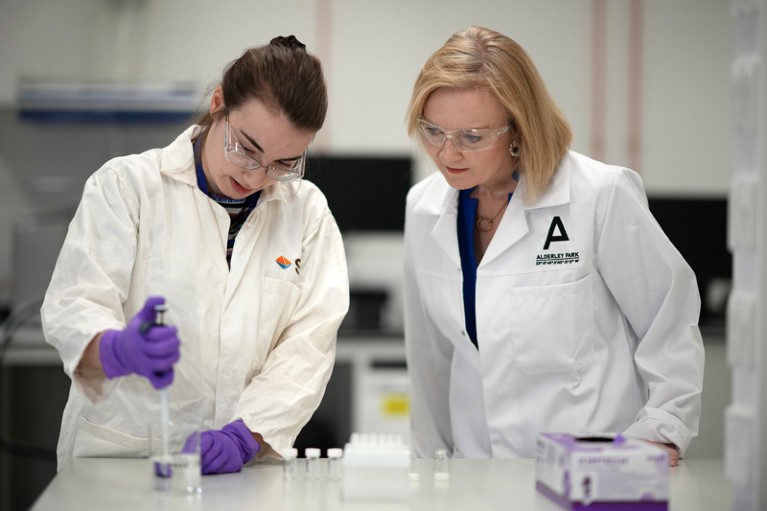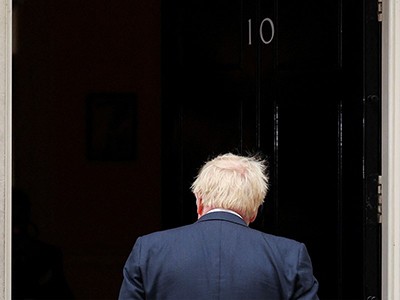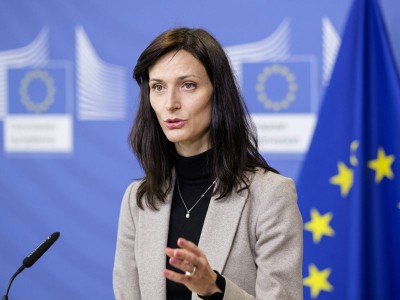
Liz Truss (right) on a campaign visit last month to Alderley Park life-sciences campus in northwest England.Credit: Christopher Furlong/Getty
Boris Johnson’s turbulent three years as UK prime minister ended this week. The Conservative party has chosen Liz Truss to be its leader and — thanks to its majority in the House of Commons — the new prime minister.
With Truss, the former foreign secretary, taking the top job, it is essential to steady a ship of state facing new economic and political headwinds as a result of rampant inflation, leading to rapidly rising energy and living costs.
As Nature has reported (Nature 607, 212; 2022), the past three years have been a roller coaster for government–academia relations in the United Kingdom. Johnson’s government was fond of slogans like ‘Global Britain’ and ‘science superpower’, and there were some notable achievements. But these were overshadowed by a litany of lows.
In her campaign to become party leader, Truss often spoke of her record of delivery, including securing trade arrangements with other countries in the aftermath of Brexit, the United Kingdom’s departure from the European Union. For researchers, however, such deals have by no means outweighed the negative consequences of the Johnson government — of which Truss was part — pursuing the hardest of hard Brexits, that is to say, making a radical break with previous EU arrangements. Notably, that has frozen UK scientists out of Horizon Europe, one of the world’s largest research-funding programmes, as the UK government and the EU head to the courts to resolve continuing post-Brexit differences.
Memo to Boris Johnson’s successor: tell the truth, respect evidence and restore trust
Johnson’s government also saw tensions between government, universities and higher-education compliance and regulatory bodies, as differences mounted over issues from funding to academic freedom and the ‘culture wars’. Truss’s government must ration the buzzwords and deliver for research. That needs a more constructive relationship between the UK government and the EU and between government and UK universities. The government needs also to accept its own long-standing principle of keeping at ‘arm’s length’ from regulatory and funding bodies.
One immediate priority has to be funding. The Johnson government established the Advanced Research and Invention Agency (ARIA), a high-risk, high-reward research funder with a budget of £800 million (US$920 million), at least until December 2024, and modelled on the US Defense Advanced Research Projects Agency, DARPA. Truss must now act on a commitment — made by the Conservatives in 2017 — to increase UK spending on research and development (R&D) across all fields, to achieve an eventual target of 2.4% of gross domestic product by 2027 (in 2019, it reached 1.7%). Successive administrations have kept their side of the bargain with modest increases in public R&D spending. But they have not explained how to get businesses to contribute more, which is necessary to meet the 2.4% target.
Resolving the Horizon Europe saga must also be a priority. The programme lasts for only seven years and the window of opportunity for UK researchers to participate is rapidly closing. The government is providing replacement funding to UK researchers unable to take up EU grants because of the ongoing dispute, the funding agency UK Research and Innovation confirmed last week in a correspondence article (Nature 609, 32; 2022). But if UK participation becomes impossible, Truss needs to confirm alternative arrangements so that UK researchers’ collaborations with European colleagues continue to be funded.
UK’s rupture with Horizon Europe is totally unnecessary
A further priority needs to be an honest and mature reflection on the interplay of science and politics during the pandemic. After a fumbling start to its pandemic response, the UK government was fast off the starting blocks in green-lighting efforts to procure, develop and distribute vaccines against COVID-19. The pandemic meant that Johnson and his officials had to establish a close working relationship with researchers, especially chief scientific adviser Patrick Vallance and chief medical adviser Chris Whitty. At the pandemic’s height, ministers were in constant contact with teams of scientists appointed to advise government, especially the Scientific Advisory Group for Emergencies (SAGE). But in an unusual move, a group of researchers set up a parallel advisory body, called Independent SAGE, to act as a check, not only on SAGE, but on the sources of evidence used to make pandemic policy decisions.
At times, researchers with appropriate expertise struggled to be heard by decision makers, as Trish Greenhalgh, a researcher in primary care at the University of Oxford, UK, and her colleagues explain in an article for The BMJ last week. In it, they describe the difficulties in communicating the view, supported by evidence, that SARS-CoV-2 is an airborne virus, in the face of a more dominant narrative in government that it was transmitted mainly by droplets (T. Greenhalgh et al. BMJ 378, e069940; 2022).
Researchers in the field of science and technology policy should be studying the experience of pandemic science advice: what worked well and what didn’t; who got to be heard in government circles, how and why; and why some researchers failed to break through. This work could feed into the UK COVID-19 public inquiry, which began in June.
Truth and power
Then there’s the matter of the government’s dealings with UK universities. Many university staff feel undervalued, and in February, researchers went on strike over pay, workloads and pensions. The strained relationship between government and universities isn’t helping to resolve matters, and more strikes are being considered by members of the University and College Union.
Some ministers have questioned the value of humanities and social science subjects, and made public comments criticizing independent compliance schemes such as the Athena SWAN and Race Equality charters, through which UK universities are attempting to become more welcoming of diversity and gender equality.
In a little-reported development, the UK Quality Assurance Agency for Higher Education will next year relinquish its role as the designated independent quality body for universities in England, because, in its view, the approach taken by ministers is “not consistent with standard international practice for quality bodies”. As we have written before, it is unacceptable for governments to interfere with the workings of research and higher-education regulatory and compliance bodies. Truss’s government has nothing to fear from its researchers, and everything to gain from a constructive relationship with them. Science needs government both as a funder, and as an enlightened enabler of discovery, invention and innovation. Governments have always needed science and research methods in a spectrum of policy areas, and, increasingly, as a tool to devise, test and evaluate public policies.
There will always be, and there always have been, robust conversations between scientists, science advisers and policymakers. That’s healthy. But it is unhealthy for science and, more importantly, dangerous for society, when governments undermine people who hold expert knowledge, and when governments interfere with independent regulatory processes. A change at the top must lead to a reset in thinking and practice.

 Memo to Boris Johnson’s successor: tell the truth, respect evidence and restore trust
Memo to Boris Johnson’s successor: tell the truth, respect evidence and restore trust
 UK’s rupture with Horizon Europe is totally unnecessary
UK’s rupture with Horizon Europe is totally unnecessary
 Massive strikes at UK universities over ‘unsustainable’ working conditions
Massive strikes at UK universities over ‘unsustainable’ working conditions
 UK and EU: Cherish what you have achieved and stay close
UK and EU: Cherish what you have achieved and stay close




